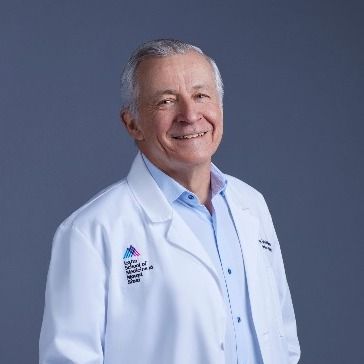Article
ReBUILD Trial Demonstrates Remyelination in MS
Author(s):
The first randomized controlled trial of a treatment to restore myelin in the MS patient CNS succeeded with an over-the-counter drug.

The first randomized clinical trial of a treatment to restore myelin damage in multiple sclerosis (MS) has demonstrated that an over-the-counter drug, clemastine fumarate, can improve the demyelinating optic neuropathy in patients with relapsing MS.
Ari Green, MD (pictured), Department of Neurology, University of California San Francisco, and colleagues noted that current treatments for MS are immune-modulators that suppress inflammatory injury, but do not prevent neuroaxonal degeneration.
“No proven treatments are available to remyelinate or otherwise sustainably repair myelin-related injury," researchers wrote.
In commentary accompanying the published study, Jeffrey Cohen, MD, Neurologic Institute, Cleveland Clinic, Cleveland OH and Paul Tesar, PhD , Department of Genetics and Genome Sciences, Case Western Reserve University School of Medicine, Cleveland, OH, agreed with this assessment.
"None of these medications directly promote repair of the damaged CNS,” Cohen and Tesar wrote. “As a result, therapies to prevent accumulation of permanent disability and, especially, to reverse pre-existing disability represent major unmet needs.”
Green and colleagues identified the potential of clemastine fumarate to restore myelin by high-throughout screening assays of drugs for capacity to stimulate primary rodent oligodendrocyte progenitor cell (OPC) differentiation and extend myelin membranes. Additional preclinical testing demonstrated the action across multiple animal models, and then in human OPC.
In designing the ReBUILD trial of clemastine fumarate in patients with relapsing MS, the researchers chose to measure treatment effect on the optic neuritis and corresponding visual impairment that is common to the illness.
"Nearly all patients with multiple sclerosis ultimately exhibit demylenating damage to the anterior visual pathway and detection of prolongation of VEP (pattern-reversal visual-evoked potential) latency has been used as supportive evidence to help confirm a clinical diagnosis of multiple sclerosis," Green and colleagues wrote.
The primary efficacy outcome was shortening of time for cortical responses to visual stimulus, which is slowed by demylenation of optic neurons. The principle measure of this function was in shortening of P100 (e.g. at approximately 100msec) latency delay on full-field, pattern-reversal (e.g. reversing black and white patterns) VEPs.
Secondary outcomes included low-contrast letter acuity (LCLA) testing and MRI lesion analysis.
Fifty patients with relapsing MS and chronic demyelinating optic neuropathy who had been on stable immunomodulatory therapy were randomized in a cross-over design to initially receive clemastine fumarate 5.36 mg orally twice daily for 90 days followed by placebo for 60 days (group 1), or to start with placebo for 90 days followed by active drug for 60 days (group 2) before crossing over to the other treatment arm.
Clemastine fumarate met the primary efficacy endpoint, with reduced latency delay of 1.7 ms/eye in the pre-planned analysis of the cross-over design, and by 3.2 ms/eye in a post-hoc delayed start analysis. The researchers hadn't anticipated that the drug effect would be sustained into the placebo period, which resulted in an initial underestimation of the effect within the standard crossover model.
"The robustness of the findings were documented by the latency improvement observed in both groups of the cohort while on active treatment," the researchers wrote. "Furthermore, the sustained clinical response in the first epoch provides evidence that the observed improvement was not due to a transient effect of medication on electrical conduction but rather reflects a persistent structural change induced by treatment."
Green and colleagues wee encouraged by the findings, but noted limitations in this initial trial of a remyelinating drug effect.
"Future work will be needed to establish the longer-tem effect of remyelenation on prevention of axonal loss and disability progression, identify the extent of repair that is achievable with more selective and targeted drugs, and define the optimal dosing regimens and duration of treatment," researchers wrote.
While characterizing the magnitude of improvement with clemastine fumarate in this trial as modest, Cohen and Tesar deemed it still noteworthy.
"Although clemastine fumarate probably is not the final answer to the search for repair-promoting drugs to treat multiple sclerosis, the ReBUILD trial represents a watershed milestone in that quest," they concluded.
The study, "Clemastine fumarate as a remyelinating therapy for multiple sclerosis (ReBUILD): a randomised, controlled, double-blind, crossover trial," was published online in The Lancet this month.





